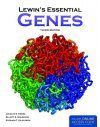Textbook
By: Jocelyn E Krebs(Author), Elliott S Goldstein(Author), Stephen T Kilpatrick(Author)
850 pages, colour illustrations
![Lewin's Essential Genes Lewin's Essential Genes]()
Click to have a closer look
About this book
Contents
Customer reviews
Biography
Related titles
About this book
Extensively reorganized and revised with the latest data from this rapidly changing field, Lewin's Essential Genes, Third Edition, provides students with a comprehensive overview of molecular biology and molecular genetics. The authors took care to carefully modify the chapter order in an effort to provide a more clear and student-friendly presentation of course material. Chapter material has been updated throughout, including a completely revised chapter on regulatory RNA, to keep pace with this advancing field. The Third Editions exceptional pedagogy enhances student learning and helps readers understand and retain key material like never before. Concept and Reasoning Checks at the end of each chapter section, End-of-Chapter Questions and Further Readings sections, as well as several categories of special topics boxes, expand and reinforce important concepts.
Contents
Part I Genes and Chromosomes
Chapter 1 Genes Are DNA
Chapter 2 Genes Code for Proteins
Chapter 3 Methods in Molecular Biology and Genetic Engineering
Chapter 4 The Interrupted Gene
Chapter 5 The Content of the Genome
Chapter 6 Genome Sequences and Gene Number
Chapter 7 Clusters and Repeats
Chapter 8 Genome Evolution
Chapter 9 Chromosomes
Chapter 10 Chromatin
Part II DNA Replication and Recombination
Chapter 11 Replication is Connected to the Cell Cycle
Chapter 12 The Replicon: Initiation of Replication
Chapter 13 DNA Replication
Chapter 14 Extrachromosomal Replication
Chapter 15 Homologous and Site-Specific Recombination
Chapter 16 Repair Systems
Chapter 17 Transposons, Retroviruses and Retrotransposons
Chapter 18 Immune Diversity
Part III Gene Expression
Chapter 19 Prokaryotic Transcription
Chapter 20 Eukaryotic Transcription
Chapter 21 RNA Splicing and Processing
Chapter 22 mRNA Stability and Localization
Chapter 23 Catalytic RNA
Chapter 24 Translation
Chapter 25 Using the Genetic Code
Part IV Gene Regulation
Chapter 26 The Operon
Chapter 27 Phage Strategies
Chapter 28 Eukaryotic Transcription Regulation
Chapter 29 Epigenetic Effects are Inherited
Chapter 30 Regulatory RNA
Customer Reviews
Biography
Jocelyn E. Krebs has been a member of the Department of Biological Sciences at the University of Alaska Anchorage since 2000. She received her B.A. in Biological Sciences from Bard College in 1991 and her PhD in Molecular and Cell Biology from the University of California Berkeley in 1997. Her research focuses on the mechanisms by which DNA transactions such as transcription and repair are accomplished in the context of chromatin. Her teaching interests are in Molecular Biology (taught at the undergraduate, graduate, and first-year medical school levels), as well as the Molecular Biology of Cancer.
Elliott S. Goldstein earned his B.S. in Biology from the University of Hartford (Connecticut) and his Ph.D. in Genetics from the University of Minnesota, Department of Genetics and Cell Biology. Following this, he was awarded an N.I.H. Postdoctoral Fellowship to work with Dr. Sheldon Penman at the Massachusetts Institute of Technology. Leaving Boston, he joined the faculty at Arizona State University in Tempe, where he is an Associate Professor in the Cellular, Molecular and Biosciences program in the School of Life Sciences, and in the Honors Disciplinary Program. His research interests are in the area of molecular and developmental genetics of early embryogenesis in Drosophila melanogaster. In recent years, he has focused on the Drosophila counterparts of the human proto-oncogenes jun and fos. His primary teaching responsibilities are in the undergraduate General Genetics course as well as the graduate level Molecular Genetics course.
Stephen T. Kilpatrick is an Associate Professor of Biology at the University of Pittsburgh at Johnstown (UPJ). He received a B.S. in Biology for Eastern College (now Eastern University) and a PhD from the Program in Ecology and Evolutionary Biology at Brown University. His research an teaching interests are in evolutionary molecular genetics. UPJ is an undergraduate degree-granting campus of the University of Pittsburgh, and Dr. Kilpatrick regularly teaches undergraduate courses in majors introductory biology, genetics, evolution, molecular genetics, and biostatistics. Prior to coauthoring the Second Edition of Lewin's Essential Genes, Dr. Kilpatrick has co-authored the test banks for the first edition and for Lewin's GENES VIII and GENES IX. He has also authored ancillaries and pedagogical materials for several introductory non-majors and majors biology and genetics textbooks.
Textbook
By: Jocelyn E Krebs(Author), Elliott S Goldstein(Author), Stephen T Kilpatrick(Author)
850 pages, colour illustrations



























